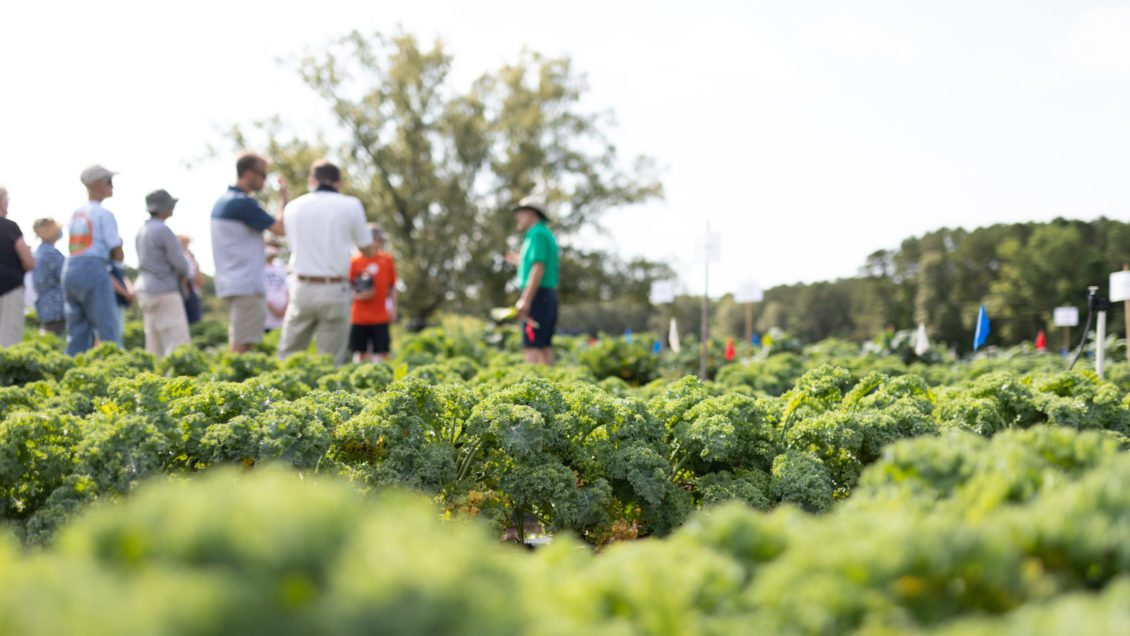Farming Johns Island across nine generations since 1725, the Legare family has grown everything from sea island cotton in the “old days” to a modern-day operation of mostly vegetables, along with cattle, hogs, two rolling markets and a bustling pumpkin patch each fall.
But even with nearly three centuries of agricultural expertise in his bloodline, Thomas Legare knows there’s always more to learn.
And Legare said that’s why he attended the Coastal Research and Education Center (REC) Field Day in June to hear Clemson University scientists share their research, including the newest ideas and tips for Lowcountry growers such as himself.
“I always come here to the Field Day because I learn something every year I come,” Legare said. “Working with Clemson Extension and the RECs around the state has been a great benefit to me; working with Clemson has been a great thing for me.”
Legare lauded the Clemson Extension Livestock & Forages team for its work in aiding his cattle operation and the Food Crop Horticulture team for assisting with his vegetables.
“We always can count on them if we have a problem to be able to pick up the phone and call them and they can give us answers,” Legare said. “And I always learn something new when I come out to the field days — new varieties, new things to try — and it’s always a great benefit.”
The CREC, located on Savannah Highway in Charleston, is one of Clemson’s six RECs strategically located throughout South Carolina according to the state’s unique soil types and climate regions.
Zack Snipes, Extension area horticulture agent for Beaufort and Charleston counties, said field days are aimed at offering an opportunity to farmers and those in the agriculture industry, as well as the public, to learn about the research taking place and how it benefits the environment, producers and the industry.
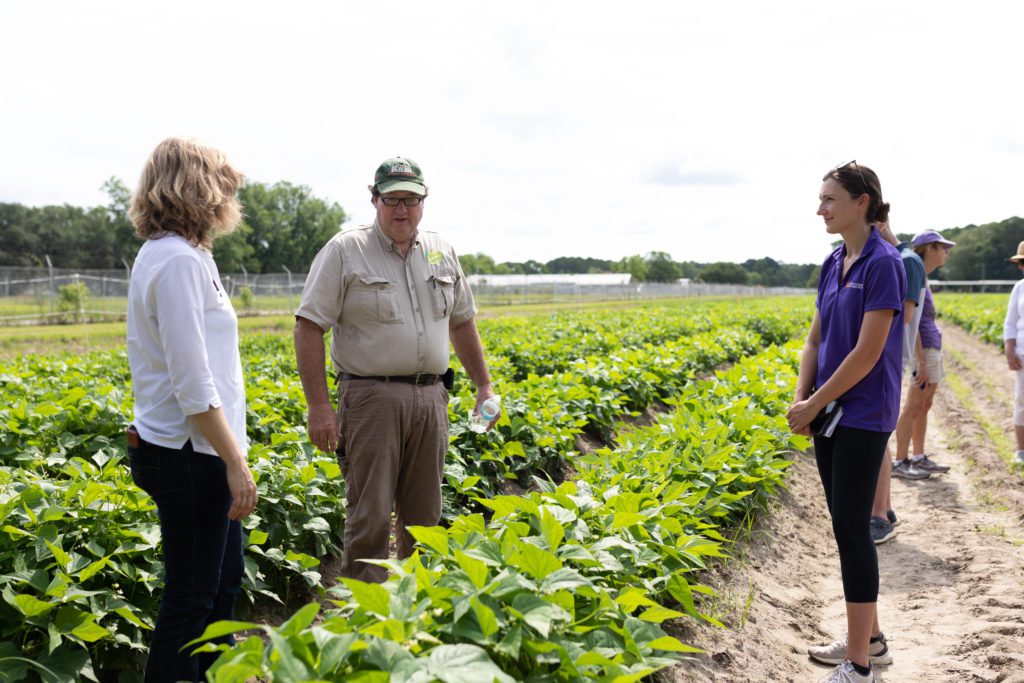
“It’s a really great event to showcase not only how we’re helping these industries, but also how we’re helping put food on people’s plates,” Snipes said.
While there is a natural association between the Lowcountry and seafood as the staple of its local cuisine, Snipes said locally grown produce was also a vital part of Charleston’s booming culinary scene.
“People think about Charleston for the seafood, the shrimp and the flounder, but when you go to restaurants, there’s a lot of local produce being served — and that local produce has to be grown locally,” Snipes said. “So, what’s neat about this research center is we do research that’s targeted for the people on the sea islands and the coast. The varieties that we’re growing, the research that we’re doing, is targeted to those growers so they can be more successful and they can sell to the chefs and distributors. So, when the tourists — or even locals — go out to eat, they can have a locally grown product and know that we’ve done research on it and helped the farmers who grew it be more sustainable.”
During a trailer ride tour of the CREC Farm for the Field Day, those in attendance got updates on herbicide, insecticide and fungicide programs, as well as updates on novel techniques in organic vegetable production.
The tour began with Tyler Campbell, technician in the weed science laboratory under Assistant Professor Matthew Cutulle, educating those in attendance about the stale seed bed technique, a weed management technique that removes non-dormant weeds from the germination zone of a seedbed prior to crop planting.
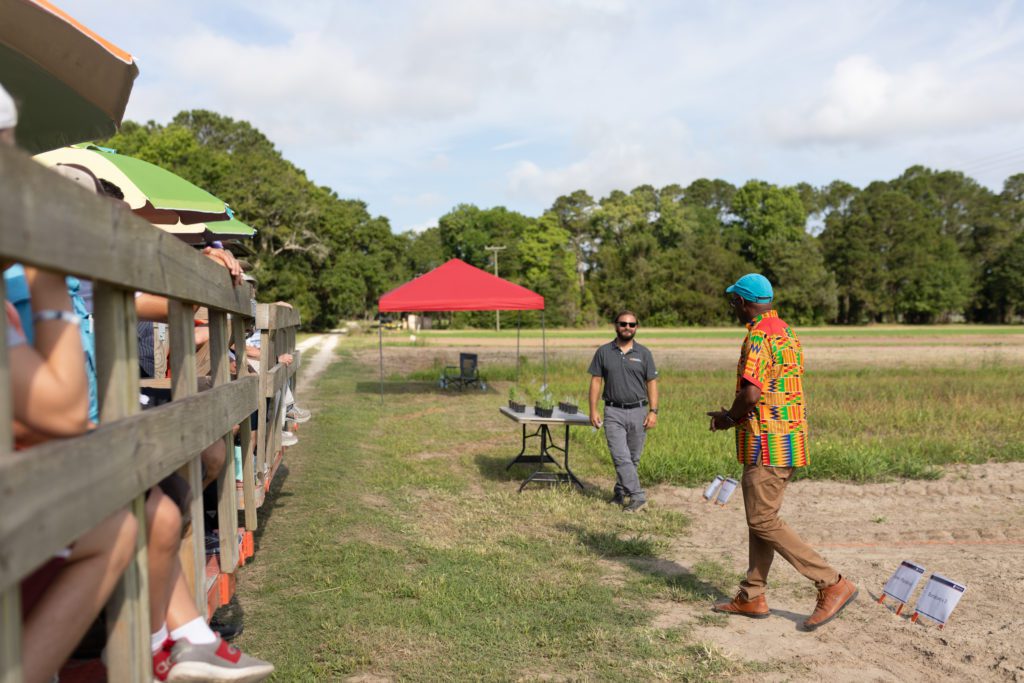
“The idea behind the stale seed bed technique, sort of counterintuitively, you want to promote as much weed germination as possible,” Campbell said.
Augustine “Gus” Gubba, a plant pathologist from the University of KwaZulu-Natal in South Africa, said during the tour that he had been visiting the CREC and interacting with growers for about three months, and had been “very impressed” with the methods used for producing vegetables.
“I like most of the technology that you use — we don’t have that kind of technology in South Africa — and most importantly I was impressed by the way you guys mix up your crops,” Gubba said. “I went to a local farm with more than 30 different vegetables and said, ‘Wow, I’ve never seen this in my life.’”
At the next stop, Assistant Professor of Vegetable Entomology Tom Bilbo shared with attendees the purpose of his program as a scientist studying insects in agriculture, as well as discussing upcoming projects.
Bilbo said the overall goal of his work — what he called “the North Star that I use” — is a term called ecological intensification, or using natural processes to replace human-produced inputs such as pesticides and fertilizers, while maintaining or increasing food production per unit area.
“By ecologically intensifying agroecosystems, we harness and strengthen the insects, biodiversity, and ecosystem services we have there and this can maintain or increase crop productivity and, of course, profitability,” Bilbo said. “Because if I come up with a new technique and it’s not going to make economic sense, it’s not going to be adopted. So, I like to do a lot of work closely with growers to understand if something is going to be economically reasonable and logistically reasonable. Practically speaking, we are structuring agricultural systems to discourage pests and to encourage the beneficials — natural enemies and pollinators, those are the two groups.”
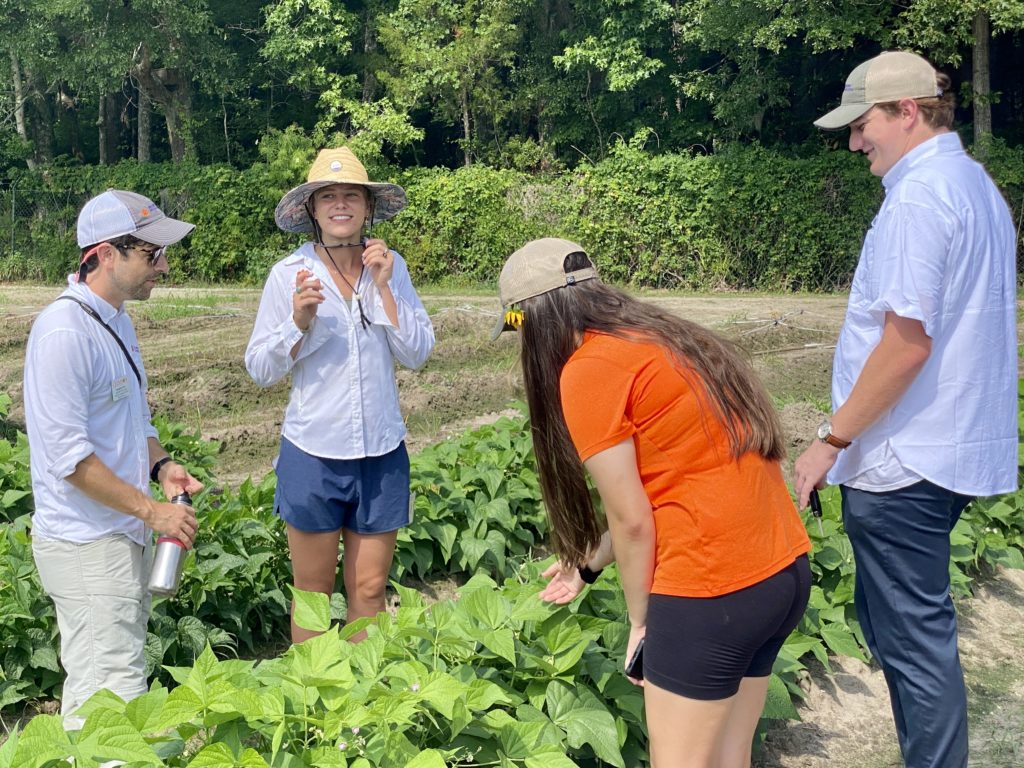
Next, Clemson Professor of Plant Pathology Anthony Keinath gave those who attended the field day an up-close look at research sponsored by the U.S. Department of Agriculture that included a variety trial of 14 different varieties of kale.
“Kale is a very European crop,” Keinath said. “It is grown all over Europe — north, south, east and west — and all of those different varieties are represented here in this trial. The purpose of these experiments is to improve management of the disease ‘black spot’ on kale, which is obviously one of the more popular leafy greens that is eaten both cooked and raw now, as well as also sold fresh and also washed and bagged.”
At the ensuing stop on the tractor tour, Assistant Professor of Vegetable Breeding and Genetics Sandra Branham said the goal of her role at CREC is to develop new vegetable varieties that are adapted to South Carolina’s conditions.
Branham’s work focuses primarily on seven crops — spinach, watermelon, cantaloupe, collard, mustard and turnip greens, and ever-popular green beans. She said of the issues that Palmetto State growers frequently battled with green beans is the state’s sweltering heat.
“When green beans get heat-stressed — when your daytime temperatures are above 86 degrees and nighttime temperatures are above 68 — the green-bean flowers for most varieties will start to fall off,” Branham said. “They won’t create pods, or if they do make pods, the pods won’t fill properly. So, it’s a major issue. You could have a grower with a huge field of green beans and then you get an unexpected heat wave and all the flowers fall off — they’ve lost their entire crop. So, that’s one of the reasons that I’m working on heat tolerance.”
Visitors to the field day also heard information from field technician Matt Horry, who has been working with Assistant Professor Brian Ward on a pair of studies taking place at the CREC Farm — one nutrient study utilizing organic products as well as a fertility program.
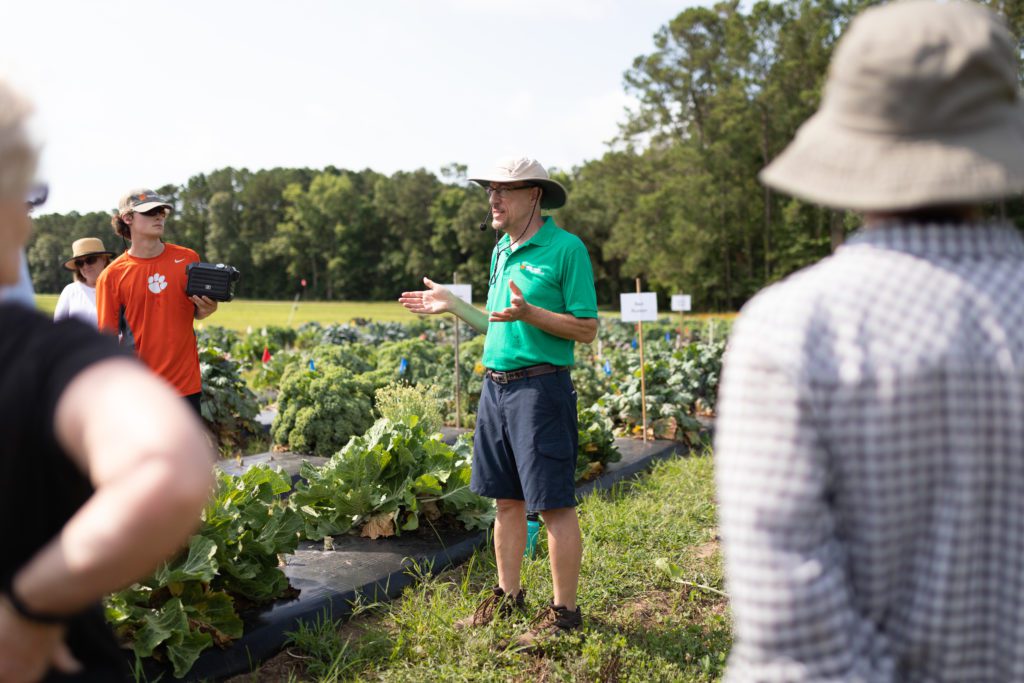
“I’m very pleased to be able to speak about this study today because one of my favorite things to grow is tomatoes — so I clearly like a challenge and beating my head against a brick wall,” Horry joked. “We’re doing this study in conjunction with Monty’s Plant Food company, and we have six different treatments that are using different amounts of their product. We’re trying to optimize both the yield and quality of tomatoes and also looking at post-harvest handling — so how they hold up while they’re being stored and the quality as time goes on.”
Known collectively as the Clemson Experiment Station, Clemson University’s six RECs are an interconnected network of high-tech labs, scientists and students tackling challenges in the areas of precision agriculture, plant genetics, natural resources management, sustainability, soil health, agribusiness management, livestock production and more.
And those research discoveries reach far beyond Clemson facilities to stakeholders and South Carolina citizens through not only field days, but also a robust Clemson Cooperative Extension Service with a statewide network of offices, agents and experts who hold remote, in-person and one-on-one educational sessions in classrooms and on farms.
“My role as an Extension agent is to really connect the growers and the general public with what research is going on,” Snipes said. “Oftentimes the researchers are busy writing grants or doing the research on the farm, so myself and other Extension agents are kind of the conduit between the two groups to let the researchers know what’s happening in the fields … and also taking the information from the researchers and reporting that to the growers to improve how they produce crops. We’re the connector between those two groups to get them communicating and open up lines of communication.”
Get in touch and we will connect you with the author or another expert.
Or email us at news@clemson.edu

